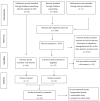Alexithymia and Athletic Performance: Beneficial or Deleterious, Both Sides of the Medal? A Systematic Review
- PMID: 35326989
- PMCID: PMC8955528
- DOI: 10.3390/healthcare10030511
Alexithymia and Athletic Performance: Beneficial or Deleterious, Both Sides of the Medal? A Systematic Review
Abstract
Background: Numerous studies have been published on alexithymia among athletes in the last decades. The objective, here, is to provide a critical review on alexithymia in sport and identify elements demonstrating that alexithymic athletes can attain a competitive advantage.
Methods: The Center for Reviews and Dissemination guidelines were used. The Preferred Reporting Items for Systematic Review and Meta-Analysis (PRISMA) guidelines served as the template for reporting the present systematic review. We searched PubMed, Embase, Science Direct, and PsycINFO, without language or date restrictions.
Results: Within 72 eligible studies, 23 articles fulfilling the selection criteria were included in the review. Alexithymia is associated with various pathologies and considered to be counter-performing. However, despite considerable suspicion of an advantageous performance effect of alexithymia, there is a lack of data to quantify this effect. Studies identified are heterogeneous (different scales of measurement of alexithymia used or outcomes, different sports), that do not allow us to conclude on an observed causal relationship, because the studies are mostly observational.
Conclusion: This systematic review opens a new search field on alexithymia, as possibly promoting performance.
Keywords: alexithymia; athlete; emotion; performance; sport psychology.
Conflict of interest statement
The authors declare no conflict of interest.
Figures
Similar articles
-
Alexithymia and Inflammatory Bowel Disease: A Systematic Review.Front Psychol. 2020 Aug 19;11:1763. doi: 10.3389/fpsyg.2020.01763. eCollection 2020. Front Psychol. 2020. PMID: 32973596 Free PMC article.
-
The Concept of Sport Sampling Versus Sport Specialization: Preventing Youth Athlete Injury: A Systematic Review and Meta-analysis.Am J Sports Med. 2020 Sep;48(11):2850-2857. doi: 10.1177/0363546519899380. Epub 2020 Jan 21. Am J Sports Med. 2020. PMID: 31961703
-
Psychometric properties of self-report concussion scales and checklists.J Athl Train. 2012 Mar-Apr;47(2):221-3. doi: 10.4085/1062-6050-47.2.221. J Athl Train. 2012. PMID: 22488289 Free PMC article.
-
Beyond the black stump: rapid reviews of health research issues affecting regional, rural and remote Australia.Med J Aust. 2020 Dec;213 Suppl 11:S3-S32.e1. doi: 10.5694/mja2.50881. Med J Aust. 2020. PMID: 33314144
-
An Association between Alexithymia and the Characteristics of Sport Practice: A Multicenter, Cross-Sectional Study.Healthcare (Basel). 2022 Feb 25;10(3):432. doi: 10.3390/healthcare10030432. Healthcare (Basel). 2022. PMID: 35326910 Free PMC article.
Cited by
-
Occurrence of Alexithymia and Its Association with Sports Practice from a Sample of University Students: Results from a French Cross-Sectional Study.Healthcare (Basel). 2022 Apr 23;10(5):788. doi: 10.3390/healthcare10050788. Healthcare (Basel). 2022. PMID: 35627924 Free PMC article.
-
Boosting effect of regular sport practice in young adults: Preliminary results on cognitive and emotional abilities.Front Psychol. 2022 Sep 28;13:957281. doi: 10.3389/fpsyg.2022.957281. eCollection 2022. Front Psychol. 2022. PMID: 36248595 Free PMC article.
-
Prevalence of alexithymia and depression among professional contemporary French dancers.Front Sports Act Living. 2025 Apr 10;7:1515051. doi: 10.3389/fspor.2025.1515051. eCollection 2025. Front Sports Act Living. 2025. PMID: 40276306 Free PMC article.
References
-
- Loas G. L’alexithymie. Ann. Méd.-Psychol. Rev. Psychiatr. 2010;168:712. doi: 10.1016/j.amp.2010.08.002. - DOI
Publication types
LinkOut - more resources
Full Text Sources


